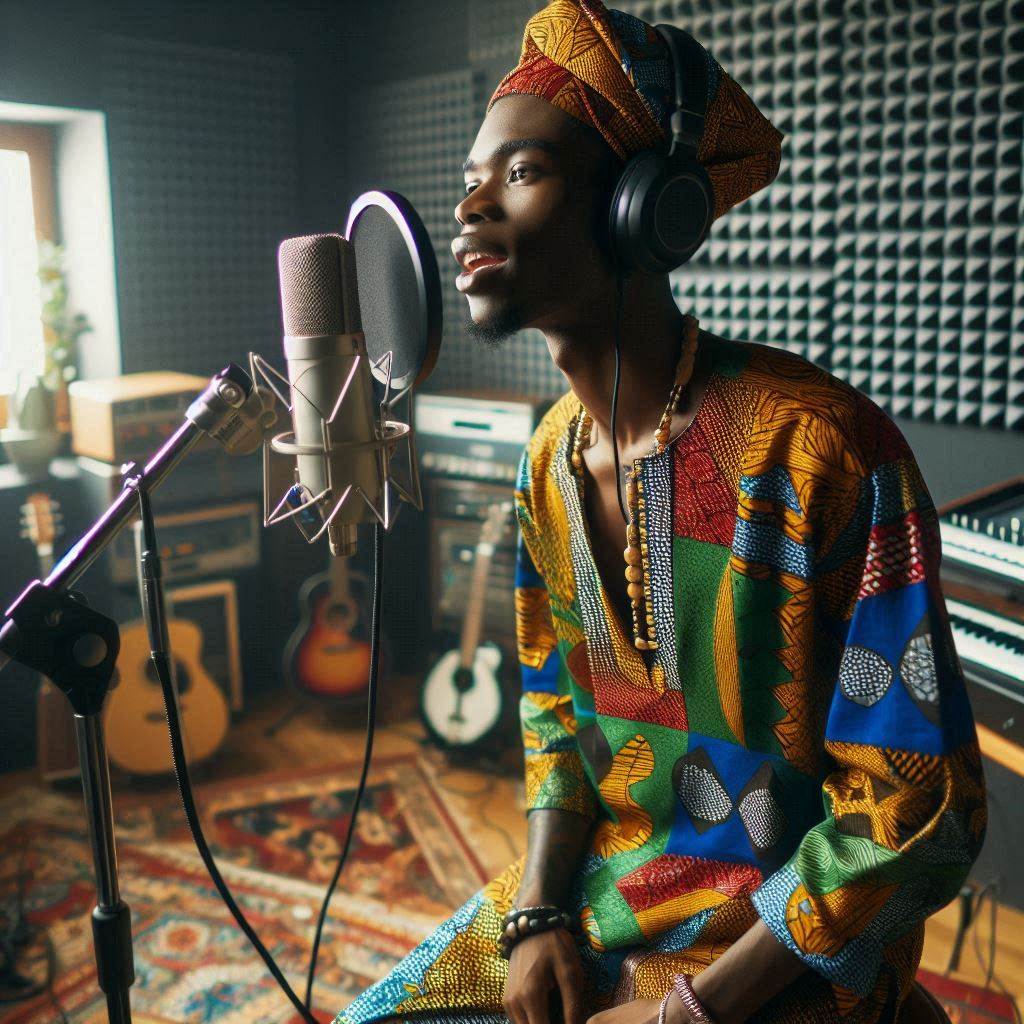Introduction
Traditional music in Nigeria boasts a rich history, deeply rooted in diverse ethnic cultures and regional sounds.
This music includes genres like Yoruba drumming, Igbo highlife, Hausa praise singing, and many others, each with unique rhythms, instruments, and melodies.
Traditional music serves as a vehicle for ceremonies, storytelling, and cultural preservation, reflecting the everyday life and spiritual beliefs of the people.
Nigerian pop music, often referred to as Afropop or Naija pop, emerged prominently in the late 20th century.
It represents a blend of indigenous musical traditions and contemporary global influences.
Nigerian pop artists ingeniously fuse traditional rhythms, such as talking drums and African percussion, with modern beats from genres like hip-hop, R&B, dancehall, and electronic dance music.
This creative fusion results in a vibrant and unique musical style that resonates both locally and globally.
The dynamic interplay between traditional and modern elements makes Nigerian pop music distinct.
By incorporating traditional sounds, Nigerian pop artists pay homage to their cultural heritage while appealing to contemporary audiences.
History of Traditional Music in Nigeria
Traditional music in Nigeria has a rich history that dates back centuries, deeply rooted in the diverse cultures and traditions across the country.
Origins and Cultural Significance
The origins of traditional music in Nigeria can be traced back to various tribes and ethnic groups that have inhabited the region for generations.
Music has always played a vital role in Nigerian cultural practices, serving as a means of communication, storytelling, and preservation of heritage.
Different Types of Traditional Music in Nigeria
There are several types of traditional music in Nigeria, each unique to the different ethnic groups that exist within the country.
- Highlife music, which originated in Ghana but has been adopted in Nigeria, is characterized by its upbeat rhythms and melodic tunes.
- Juju music, popularized by artists like King Sunny Ade, combines traditional Yoruba music with modern instruments like the guitar and synthesizer.
- Afrobeat, pioneered by the legendary Fela Kuti, fuses traditional African rhythms with jazz, funk, and highlife music.
- Fuji music, a genre created by Sikiru Ayinde Barrister, blends traditional Yoruba percussion with elements of Islamic music.
Influence on Nigerian Society and Culture
Traditional music has had a profound impact on Nigerian society and culture, shaping the country’s identity and influencing various aspects of life.
Music is often used to celebrate significant events like weddings, festivals, and ceremonies, bringing people together to share in the cultural heritage.
Traditional music in Nigeria also serves as a tool for social commentary, addressing important issues and advocating for social change through the power of music.
The influence of traditional music can be seen in contemporary Nigerian pop music, as artists draw inspiration from their cultural roots to create a unique blend of sounds that resonates with audiences both locally and internationally.
Overall, traditional music in Nigeria continues to play a vital role in preserving the country’s rich cultural heritage and shaping its vibrant music scene for generations to come.
Read: Psychological Impact of COVID-19 on Nigerians
Evolution of Nigerian Pop Music
Nigerian pop music has undergone a fascinating evolution, marked by the emergence of unique sounds and the incorporation of traditional elements.
The genre’s growth has been fueled by the creativity and resilience of Nigerian artists, who have successfully blended indigenous and contemporary influences.
Emergence of Nigerian Pop Music
Nigerian pop music, often referred to as Afropop or Naija pop, emerged in the late 20th century.
The genre evolved from Nigeria’s rich musical heritage, including highlife, juju, and Afrobeat.
These styles laid the foundation for the development of modern Nigerian pop music.
In the 1980s and 1990s, artists began experimenting with Western genres like hip-hop, R&B, and dancehall, blending them with local sounds.
This experimentation led to the birth of a new, vibrant musical style that resonated with young Nigerians.
Early pioneers like King Sunny Adé and Fela Kuti influenced this transition, incorporating elements of traditional music into their innovative sounds.
These artists set the stage for the future of Nigerian pop music, blending traditional and modern elements seamlessly.
Incorporation of Traditional Music Elements
Traditional music elements play a crucial role in Nigerian pop music.
Artists incorporate indigenous rhythms, instruments, and melodies to create a unique sound.
The talking drum, shekere, and agidigbo are commonly used, adding a distinct African flavor to modern beats.
These traditional instruments provide a rhythmic foundation that is both familiar and innovative.
Melodies and harmonies from traditional music are also prevalent.
Many pop songs feature call-and-response patterns, a staple in African musical traditions.
Lyrics often reflect local languages, proverbs, and stories, preserving cultural heritage while appealing to contemporary audiences.
This blend of old and new creates a rich, dynamic sound that is uniquely Nigerian.
Rise of Popular Nigerian Pop Artists and Bands
The rise of popular Nigerian pop artists and bands has further propelled the genre’s evolution.
Artists like 2Baba (formerly 2Face Idibia), D’banj, and P-Square brought Nigerian pop music to the forefront in the early 2000s.
Their catchy songs, energetic performances, and fusion of traditional and modern sounds captivated audiences.
In recent years, artists like Wizkid, Burna Boy, and Tiwa Savage have gained international acclaim.
They continue to push the boundaries of Nigerian pop music, incorporating global influences while staying true to their roots.
Wizkid’s “Ojuelegba” and Burna Boy’s “Ye” are prime examples of songs that blend traditional rhythms with modern production.
Nigerian pop bands like Sauti Sol and The Cavemen have also made significant contributions.
They infuse their music with highlife and other traditional genres, creating a nostalgic yet fresh sound.
These artists and bands have not only dominated the Nigerian music scene but have also achieved global recognition, putting Nigerian pop music on the world map.
Read: How Nigerian Schools Address Student Psychology
Impact of Traditional Music on Nigerian Pop
Traditional music in Nigeria has played a significant role in shaping the country’s popular music scene.
The influence of traditional music can be seen through the use of traditional instruments and rhythms, lyrics and themes inspired by traditional music, and the fusion of traditional and modern music elements.
Use of Traditional Instruments and Rhythms
One of the most notable ways traditional music has influenced Nigerian pop is through the use of traditional instruments and rhythms.
Instruments such as talking drums, shekere, and the udu are commonly incorporated into modern pop songs.
These instruments add a unique African sound to the music and create a distinct Nigerian flavor.
The rhythmic patterns found in traditional Nigerian music have also been integrated into pop music.
Nigerian pop songs often feature polyrhythms, syncopation, and call-and-response vocal patterns, creating a lively, dynamic atmosphere distinct from Western pop.
Lyrics and Themes Inspired by Traditional Music
Traditional Nigerian music is known for its rich storytelling and poetic lyrics that often touch on themes such as love, unity, and social issues.
These themes have been carried over into Nigerian pop music, with many artists drawing inspiration from traditional folklore and legends in their songs.
Lyrically, Nigerian pop songs often reflect the values and traditions of the country, celebrating Nigerian culture and heritage.
By incorporating themes and motifs from traditional music, Nigerian pop artists are able to connect with their audience on a deeper level and convey messages that resonate with a wider audience.
Fusion of Traditional and Modern Music Elements
One of the most exciting aspects of the influence of traditional music on Nigerian pop is the fusion of traditional and modern music elements.
This fusion has led to the creation of new genres such as afrobeat, a genre that combines traditional Yoruba music with funk, jazz, and highlife.
Furthermore, Nigerian pop artists have been experimenting with blending traditional rhythms and melodies with contemporary production techniques and electronic sounds.
This fusion of old and new creates a fresh and innovative sound that appeals to both Nigerian and international audiences.
Generally, the impact of traditional music on Nigerian pop is undeniable.
From the use of traditional instruments and rhythms to the lyrical themes inspired by traditional music, Nigerian pop music continues to be shaped by its rich musical heritage.
The fusion of traditional and modern music elements has led to the creation of a unique and vibrant music scene that celebrates the diversity and creativity of Nigerian culture.
Read: Renowned Nigerian Psychologists to Follow

Influence of Traditional Music on Nigerian Pop Artists
Traditional music has profoundly influenced Nigerian pop artists, shaping their music styles and enriching their sound.
This influence is evident in the works of several popular Nigerian pop artists who blend traditional elements with contemporary styles.
Here, we explore case studies of these artists, examining how traditional music has shaped their music and providing examples of songs that showcase this influence.
Case Studies of Popular Nigerian Pop Artists
Several Nigerian pop artists have successfully integrated traditional music into their work.
Wizkid, Burna Boy, and Yemi Alade stand out as prime examples. Each artist uniquely incorporates traditional elements into their music, creating a distinct and influential sound.
Wizkid
Wizkid, a global Afropop sensation, often infuses his music with traditional Yoruba rhythms and melodies.
His style is a seamless blend of contemporary and traditional sounds, making his music appealing to diverse audiences.
Burna Boy
Burna Boy, known for his Afro-fusion style, heavily incorporates traditional African rhythms, especially those from his Yoruba heritage.
His music often reflects his cultural background, blending modern beats with traditional sounds.
Yemi Alade
Yemi Alade, celebrated for her energetic performances and vibrant music, frequently incorporates elements of highlife and Afrobeat.
Her songs often showcase traditional instruments and rhythms, celebrating her African roots.
How Traditional Music Has Influenced Their Music Style
Traditional music has played a crucial role in shaping these artists’ music styles.
It has provided a rich source of rhythms, melodies, and storytelling techniques.
These elements enhance their music, making it more authentic and relatable to their audiences.
Wizkid’s music style reflects his Yoruba heritage through the use of traditional rhythms and melodies.
His songs often feature call-and-response patterns, a common element in Yoruba music.
This connection to his roots adds depth to his sound, making it resonate with listeners worldwide.
Burna Boy’s Afro-fusion style showcases a strong influence from traditional African music.
He often uses traditional percussion instruments, creating a rich rhythmic foundation for his songs.
His lyrics frequently address cultural and social themes, reflecting his African heritage and identity.
Yemi Alade’s music is deeply rooted in traditional African sounds.
She frequently incorporates highlife and Afrobeat elements, using traditional instruments like the shekere and talking drum.
Her vibrant music style celebrates African culture, appealing to a broad audience.
Examples of Songs That Showcase the Influence of Traditional Music
Several songs by these artists highlight the influence of traditional music.
Wizkid’s “Ojuelegba” is a prime example, featuring Yoruba rhythms and melodies.
The song’s traditional elements resonate with listeners, making it a global hit.
Burna Boy’s “Ye” showcases his Afro-fusion style, blending modern beats with traditional African rhythms.
The song’s use of traditional percussion and its cultural themes highlight Burna Boy’s connection to his roots.
Yemi Alade’s “Johnny” incorporates highlife elements, creating a lively and engaging sound.
The use of traditional instruments and rhythms reflects her African heritage, making the song a celebration of her cultural identity.
Read: Challenges in Teaching Christian Religious Studies
Cultural Preservation and Global Recognition
Traditional music plays a vital role in preserving Nigerian culture. It serves as a repository of history, values, and stories.
Through music, traditions are kept alive, providing a sense of identity and continuity for future generations.
Role of Traditional Music in Preserving Nigerian Culture
Traditional music embodies the essence of Nigerian culture.
It encompasses various aspects of life, from rituals and ceremonies to daily activities.
This music includes rhythms, melodies, and instruments unique to each ethnic group, reflecting their distinct cultural heritage.
Artists who incorporate traditional elements into their music help preserve these cultural aspects.
By blending traditional sounds with modern styles, they ensure that these ancient traditions remain relevant.
This fusion not only entertains but also educates listeners about Nigeria’s rich cultural history.
Traditional music also promotes the use of indigenous languages.
Many Nigerian pop songs feature lyrics in local dialects, celebrating linguistic diversity.
This practice helps keep these languages alive, especially among younger generations.
Global Recognition of Nigerian Pop Music with Traditional Influences
Nigerian pop music, enriched with traditional influences, has gained significant global recognition.
Artists like Burna Boy, Wizkid, and Yemi Alade have brought Nigerian sounds to international audiences.
Their music blends traditional rhythms and instruments with contemporary beats, creating a unique and appealing sound.
Burna Boy’s Grammy-winning album “Twice as Tall” showcases his Afro-fusion style, combining traditional African elements with global influences.
This album’s success highlights the global appeal of Nigerian pop music.
Similarly, Wizkid’s collaboration with Drake on “One Dance” introduced traditional Nigerian rhythms to a broader audience, achieving international acclaim.
Yemi Alade’s “Johnny” is another example of global recognition.
The song’s use of highlife rhythms and African percussion captivated audiences worldwide.
These artists demonstrate how traditional music can enhance contemporary pop, making it resonate globally.
Importance of Preserving Traditional Music for Future Generations
Preserving traditional music is crucial for maintaining cultural heritage.
As globalization intensifies, traditional practices risk being overshadowed by modern influences.
Ensuring that traditional music endures is vital for cultural diversity and identity.
Educational initiatives can play a key role in preserving traditional music.
Schools can include traditional music in their curricula, teaching students about their cultural heritage.
Workshops and festivals can also promote traditional music, providing platforms for artists to showcase their talents.
Documenting traditional music is another important step.
Recording traditional songs and performances ensures that future generations can access and learn from these cultural treasures.
Digital platforms can make these recordings widely available, preserving them for posterity.
Conclusion
The influence of traditional music on Nigerian pop is profound, infusing it with a rich tapestry of cultural flavors.
Nigerian pop artists draw from a deep well of traditional rhythms, melodies, and instruments, creating a vibrant fusion of past and present.
Embracing cultural heritage in music is not just about preserving traditions; it’s about celebrating identity and connecting with audiences on a profound level.
In Nigerian pop, this connection is palpable, as artists weave stories of tradition and modernity into their music, captivating listeners worldwide.
The significance of traditional music in Nigerian pop cannot be overstated.
It serves as a bridge between generations, linking the wisdom of the past with the innovations of the future.
As Nigerian pop continues to gain global recognition, it carries with it the soul of traditional music, reminding us of the rich cultural heritage that inspires its melodies.
In the end, traditional music is the heartbeat of Nigerian pop, pulsating with the rhythms of a nation’s history and culture.
Embracing this heritage ensures that Nigerian pop remains authentic, dynamic, and universally resonant for generations to come.




